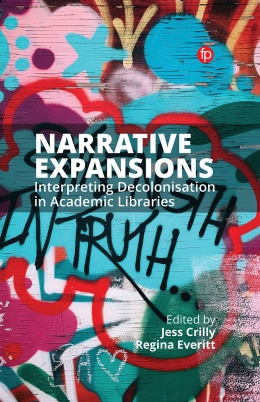
Primary tabs
You don't need to be an ALA Member to purchase from the ALA Store, but you'll be asked to create an online account/profile during the checkout to proceed. This Web Account is for both Members and non-Members.
If you are Tax-Exempt, please verify that your account is currently set up as exempt before placing your order, as our new fulfillment center will need current documentation. Learn how to verify here.
- Description
- Table of Contents
- About the authors
- Reviews
The demand to decolonize the curriculum has moved from a protest movement at the margins to the center of many institutions, as reflected by its inclusion in policies and strategies and numerous initiatives in libraries and archives that have responded to the call, and are critically examining their own historic legacies and practices to support institutional and societal change.
This collection explores the ways in which academic libraries are working to address the historic legacies of colonialism, in the context of decolonizing the curriculum and the university. It acknowledges and explores the tensions and complexities around the use of the term decolonization, how it relates to other social justice aims and approaches, including critical librarianship, and what makes this work specific to decolonization.
The book is international in scope, and considers the contextual nature of decolonization, with discussion of the impacts of settler colonialism, and post-colonial contexts with authors from Canada, the United States and Kenya, as well as universities and the British Library in the UK.
Split into two sections, the book first addresses experiential contexts, discussing the environment in which the academic library is enmeshed: legacy knowledge systems, the neoliberal university, the pervasive Whiteness of the higher education sector, the global publishing industry – how these structures are constitutive of coloniality and how they can be challenged. It then brings together theory and practice featuring case studies interpreting what it means to 'decolonize' in information literacy, collection management, inclusive spaces, LIS education, research methods and knowledge production through the lens of critical pedagogy, critical information literacy and Critical Race Theory (CRT). The book also addresses the impact and implications of the Whiteness of university library staffing.
Bringing together the theory and practice of an area of critical concern to the academy, this book is an important reference for academic librarians, educators and researchers in LIS, education and sociology.
Introduction: Decolonise or 'Decolonise'? Jess Crilly and Regina Everitt
Part 1 Contexts and Experiences
1 Decolonising the Library: From Personal Experience to Collective Action A conversation with Hillary Gyebi-Ababio
2 Intelligent Leaders, Intelligent Spaces Regina Everitt
3 Decolonising Research Methodologies Sara Ewing
4 Do Black Employees' Rights Matter? The Lived Experience of BAME Staff in UK Academic Libraries Mohammed Ishaq and Asifa Maaria Hussain
5 Decolonising the Academic Library: Reservations, Fines and Renewals Lurraine Jones and Marcia Wilson
6 Critical Information Literacy and Structural Oppression: Reflecting on Challenges and Looking Forward Angela Pashia
Part 2 In Practice
7 The Contribution of Library and Information Science Education to Decolonising Briony Birdi
8 Indigenising Canadian Academic Libraries: Two Librarians' Experiences Rachel Chong and Ashley Edwards
9 Liberate the Library: What It Means to Decolonise and Why It Is Necessary Marilyn Clarke
10 Opening Spaces for Creative and Critical Enquiry Alexandra Duncan, Vivienne Eades-Miller and Adam Ramejkis
11 Towards Decolonising the British Library: A Staff-Led Perspective Pardaad Chamsaz on behalf of and in collaboration with the British Library BAME Staff Network Decolonisation Working Group
12 Cataloguing, Classification and Critical Librarianship at Cambridge University Cambridge University Decolonising Through Critical Librarianship Group
13 Re-membering Kenya: Building Library Infrastructures as Decolonial Practice Syokau Mutonga and Angela Okune
14 Challenging Its Imperial Origins: Towards Decolonising SOAS Library Ludi Price
15 Decolonising Library Collections: Contemporary Issues, Practical Steps and Examples from London School of Economics Kevin Wilson
Afterword: Challenging the Narrative of the Storyteller Regina Everitt
Jess Crilly
Jess Crilly is an independent author and has worked mainly in academic libraries, most recently as Associate Director for Content and Discovery, Library Services, University of the Arts London, up to September 2020. Jess's interests include critical librarianship, the meaning of and possibilities for the decolonisation of knowledge, and the multiple contexts and uses of archives.
Regina Everitt
Regina Everitt is Assistant Chief Operating Officer (ACOO) and Director of Library, Archives and Learning Services at the University of East London. She began her professional career as a technical author/trainer working with computer companies that developed software for the manufacturing, pharmaceutical and financial sectors in the US and UK. After managing a small library at a university in West Africa as a volunteer with the United States Peace Corps, she transitioned into the HE sector, developing and managing libraries, social learning spaces and other learning resources. At University of East London, she is institution lead on excellence in customer service delivery.
"Written in two distinct sections, Narrative Expansions explains how vital telling stories from different perspectives is ... Readers learn how libraries address decolonization and strive to tell the story from different perspectives. Offering theory and ideas on getting started with these projects, this book is appropriate for collection development librarians and administrators."
— Choice


